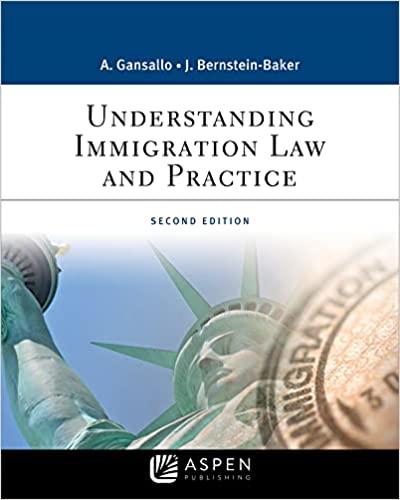Question
Legal Environment problems Answer the following question. Give your reason(s) When the Whitehouses decided to breed horses, they went horse shopping at the Lange's ranch.
Legal Environment problems
- Answer the following question. Give your reason(s)
When the Whitehouses decided to breed horses, they went horse shopping at the Lange's ranch. Although the Whitehouses had owned horses, they had no experience in horse breeding. Knowing the buyers would breed the horse, Lange suggested a particular mare. After the sale, the Whitehouses discovered that this mare was infertile and sued for breach of warranty. Will the buyers win? If so, under which UCC warranty?
- See the Blue Ship Tea Room case brief. Then read the Goodman v. Wenco Foods case. Why the different results in the two cases? (Other than one case is about fish soup, and the other is about a hamburger).
Webster vs. Blue Ship Tea Room
Facts: Blue Ship Tea Room was a Boston restaurant that served Webster, a New England native some fish chowder. The fish chowder was a creamy soup and was therefore opaque.After 3-4 spoonfuls, Webster felt something lodged in her throat. After two different throat surgeries, a fishbone was found and removed. Webster filed a lawsuit for a breach of the implied warranty of merchantability.
Issue/Question:Does fish chowder that contains a fishbone constitute a breach of the implied warranty of merchantability?
Decision: The jury from the trial court found the defendant restaurant liable for a breach of the implied warranty of merchantability.However, upon appeal to the State Supreme Court, they overturned the decision and ruled in favor of the restaurant. The Court stated that there should be a known risk of a possible fish bone in fish chowder. Being a New England native, the plaintiff Webster should have known to beware of such a hazard. The finding of the jury and the trial court was reversed.
Goodman v. Wenco Foods, Inc.
333 N.C. 1 North Carolina Supreme Court, 1992
Case Summary
FACTS: Fred Goodman and a friend stopped for lunch at a Wendy's restaurant in Hillsborough, North Carolina. Goodman had eaten about half of his double hamburger when he bit down and felt immediate pain in his lower jaw. He took from his mouth a triangular piece of cow bone, about one-sixteenth to one-quarter inch thick and one-half inch long, along with several pieces of his teeth. Goodman's pain was intense, and his dental repairs took months.
The restaurant purchased all of its meat from Greensboro Meat Supply Company (GMSC). Wendy's required its meat to be chopped and "free from bone or cartilage in excess of 1/8 inch in any dimension." GMSC beef was inspected continuously by state regulators and was certified by the United States Department of Agriculture (USDA). The USDA considered any bone fragment less than three-quarters of an inch long to be "insignificant."
Goodman sued, claiming a breach of the implied warranty of merchantability. The trial court dismissed the claim, ruling that the bone was natural to the food and that the hamburger was, therefore, fit for its ordinary purpose. The appeals court reversed this, holding that a hamburger could be unfit even if the bone occurred naturally. Wendy's appealed to the state's highest court.
ISSUE: Was the hamburger unfit for its ordinary purpose because it contained a harmful but natural bone?
DECISION: Even if the harmful bone occurred naturally, the hamburger could be unfit for its ordinary purpose.
REASONING: When an object in food harms a consumer, the injured person may recover even if the substance occurred naturally, provided that a reasonable consumer would not expect to encounter it. A triangular, one-half-inch bone shaving may be inherent to a cut of beef, but whether a reasonable consumer would anticipate it is normally a question for the jury.
Wendy's hamburgers need not be perfect, but they must be fit for their intended purpose. It is difficult to imagine how a consumer could guard against bone particles, short of removing the hamburger from its bun, breaking it apart, and inspecting its small components.
Wendy's argues that since its meat complied with federal and state standards, the hamburgers were merchantable as a matter of law. However, while compliance with legal standards is evidence for juries to consider, it does not ensure merchantability. A jury could still conclude that a bone this size in hamburger meat was reasonably unforeseeable and that an injured consumer was entitled to compensation.
- The seller is in Minneapolis, and the Buyer is in Mayville.Seller ships the goods via UPS and F.O.B. Mayville. Due to ice and snow, the UPS truck goes in the ditch along I-94 somewhere in Minnesota on the way to Mayville and the Buyer's goods are destroyed along with the UPS truck. Who bears the risk of loss?
Step by Step Solution
There are 3 Steps involved in it
Step: 1

Get Instant Access to Expert-Tailored Solutions
See step-by-step solutions with expert insights and AI powered tools for academic success
Step: 2

Step: 3

Ace Your Homework with AI
Get the answers you need in no time with our AI-driven, step-by-step assistance
Get Started


